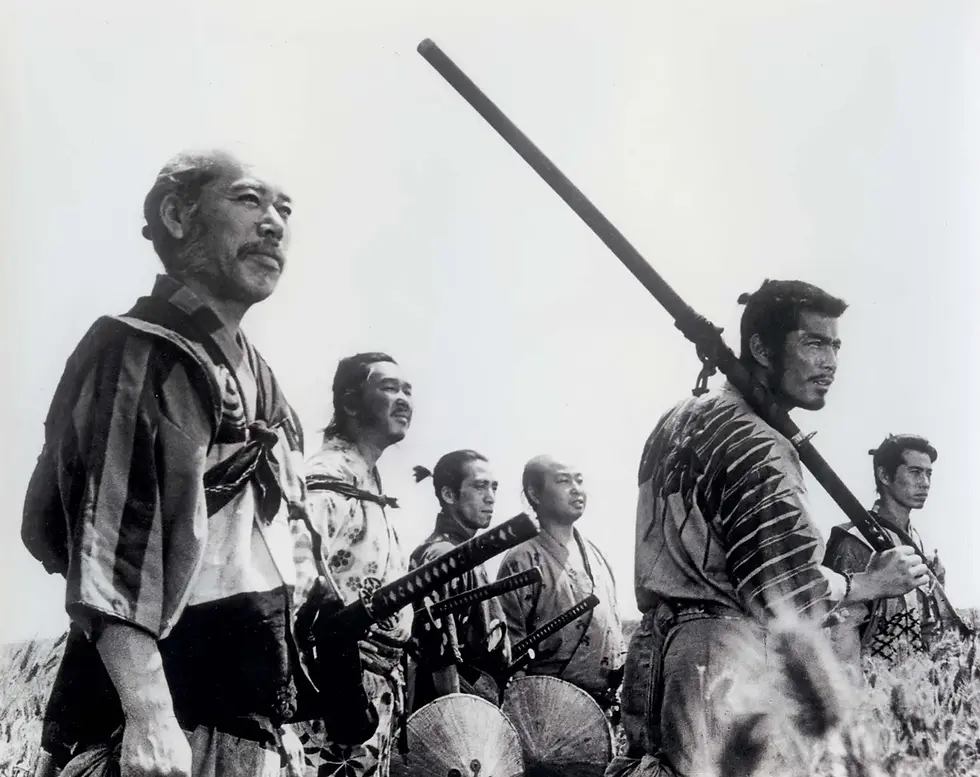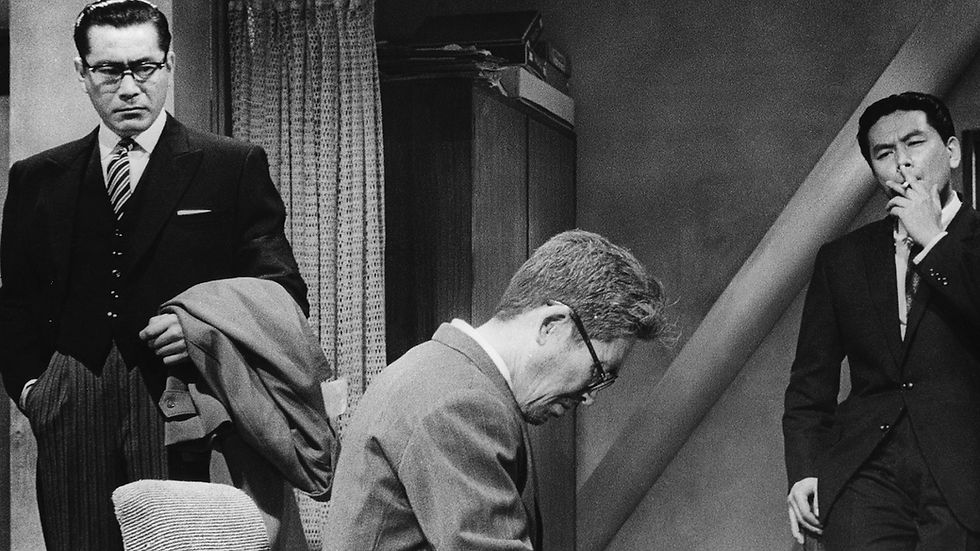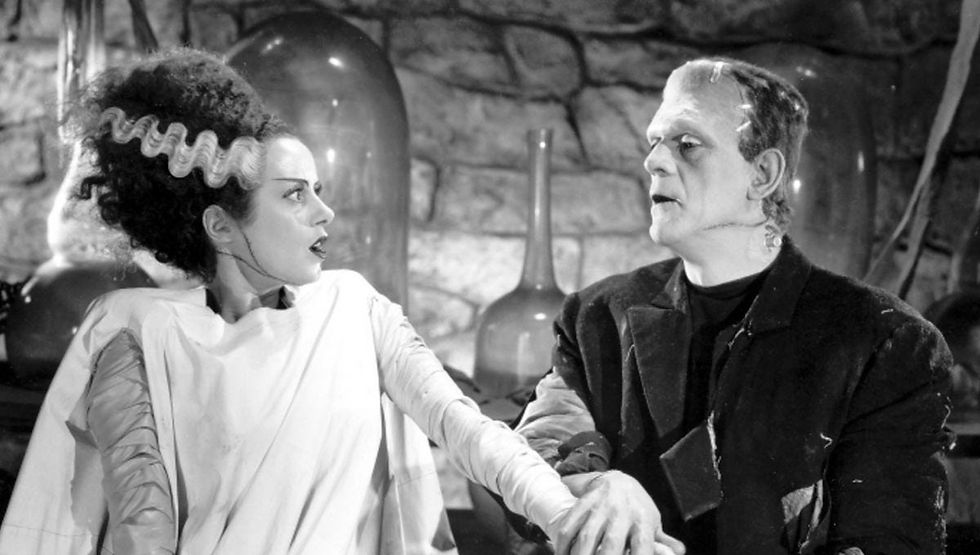Seven Samurai (1954) Review - Dylan McCully
- Dylan McCully
- Sep 22, 2023
- 3 min read
Updated: Oct 3, 2023
Written by Dylan McCully, 10/19/22
Dylan McCully's Cinema: https://www.imdb.com/list/ls521125877/

Every century, the stars align in a certain way that allows the perfect film to get made. In 1954, the circumstances were good enough to allow Akira Kurosawa to create his ultimate epic masterpiece - Seven Samurai. Being the most expensive film ever made in Japan at the time, Seven Samurai looks, sounds and feels gigantic in scope due to the high budget and intimidating length of 3:27:04. The legacy of this film can not be understated, from the memorable characters portrayed by some of Japan's finest actors, to the complicated camera movements Kurosawa meticulous planned out in order to capture the action.
In sengoku-era Japan, bandits discuss raiding this poor village, but decide to wait until after the harvest. The elder, Gisaku, decides that the farmers will find samurai that will protect the village in return for food - not money. During this scene, Gisaku's eyes don't move in the slightest. He is dead set on the samurai, and the rest of the village has to trust his wisdom as they go to look for samurai. The precise yet natural way that the actors move around the frame shows the god-tier directing ability from Kurosawa. A specific example of outstanding mise en scene is the scene in which the village warriors are sitting in the hut while the monk plays music. The direction and tilt of their heads and the subtleties in expressions of anguish are details that can upgrade a classic to a masterpiece. Seven Samurai is chock full of Kurosawa regulars, so you know that Mifune and Shimura have to show up eventually. Takashi Shimura plays an old ronin master named Kambei Shimada, who eventually leads the titular seven samurai. The villagers surround a hut where a boy was taken hostage by a thief. Kambei saves the boy and gains the respect of the villagers, who eventually convince him to join the samurai protection force. Mifune's performance is one of legendary status. He plays Kikuchiyo, a brash rogue who can hardly be considered a ronin. Kikuchiyo watches closely as Kambei saves the young boy. Mifune's intensity mixed with the subtle changes of expression during his journey to become one of the seven is an astounding feat of acting. Akira Kurosawa had this to say about Toshiro Mifune:
"Mifune had a kind of talent I had never encountered before in the Japanese film world. It was, above all, the speed with which he expressed himself that was astounding. The ordinary Japanese actor might need ten feet of film to get across an impression; Mifune needed only three. The speed of his movements was such that he said in a single action what took ordinary actors three separate movements to express. He put forth everything directly and boldly, and his sense of timing was the keenest I had ever seen in a Japanese actor. And yet with all his quickness, he also had surprisingly fine sensibilities."
Mifune notoriously studied the motions and reactions of lions in preparation for his role in Seven Samurai, which works perfectly for his character. Kambei is able to get five other samurai to join the fight, all in various relations to him and of various backgrounds. Daisuke Katō (who has acted in many Kurosawa, Ozu and Mizoguchi films) plays Shichirōji, the former lieutenant of Kambei. Isao Kimura plays Katsushirō Okamoto, an untested young fighter who Kambei for better or for worse has to train. Minoru Chiaki plays Heihachi Hayashida, the funny one. Seiji Miyaguchi plays Kyuzo, who's fighting ability is nearly unmatched. Kyuzo is introduced in one of the most memorable scenes in the film, the sparring sequence. One common technique that Kurosawa implements in a lot of his films is that of cutting to the reactions of a group of people, then back to whatever's happening, then back to the crowd, with their reactions and therefore the intensity ramped up with every cut. The lack of score here makes it seem like a move could be made between the two samurai at any moment, instead of an orchestra building up to a climactic end. For brevity's sake, the villagers and samurai learn to work together to prepare for the onslought of bandits. Who will survive and what will be left of them?
Endlessly intriguing characters with brilliant pacing, it feels cheap to classify Seven Samurai as an action movie because so much of the focus is on relationships and reasons for action. Objectively this stands the test of time better than the majority of films because at it's core it's about people. Emotions everyone can relate to with a story that's cleverly built and will have you invested. There's a reason why so many filmmakers (specifically in westerns) stole directly from Seven Samurai. 10/10
Akira Kurosawa Ranking:
Seven Samurai (1954)- 10/10
Ikiru (1952) - 9/10
Rashomon (1950) - 9/10
Stray Dog (1949) - 7.5/10
Drunken Angel (1948) - 6.5/10






Comments